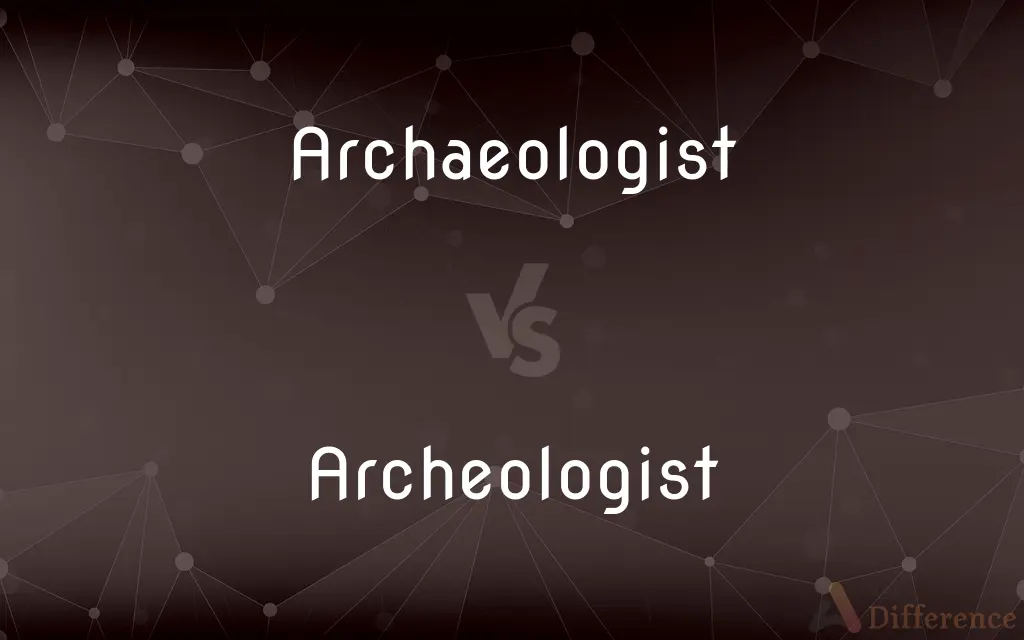Archaeologist vs. Archeologist — What's the Difference?
By Urooj Arif & Fiza Rafique — Updated on March 11, 2024
Archaeologist and archeologist refer to the same profession, focusing on studying past human activity, differing primarily in spelling preference.

Difference Between Archaeologist and Archeologist
Table of Contents
ADVERTISEMENT
Key Differences
An archaeologist is someone who studies human history and prehistory through the excavation of sites and the analysis of artifacts and other physical remains. The term "archaeologist" is more commonly used in American English, while "archeologist" represents an alternative spelling that is less frequently used but still recognized and understood.
Both terms describe a professional who engages in archaeology, the scientific study of the material remains of past human life and activities. This includes the examination of artifacts, structures, and cultural landscapes. Whether spelled as "archaeologist" or "archeologist," the role involves fieldwork, excavation, and often interdisciplinary collaboration with other fields such as anthropology, history, and geography.
The choice between "archaeologist" and "archeologist" largely comes down to regional spelling preferences and the influence of style guides or institutional standards. For example, British English tends to favor the "ae" spelling in many words, aligning with the Latin and Greek origins, whereas American English often simplifies such spellings.
While there is a difference in spelling, there is no difference in the meaning or function of the terms "archaeologist" and "archeologist." Both refer to individuals dedicated to uncovering and understanding the artifacts and sites left behind by past societies, contributing to our knowledge of human history and cultural development.
Comparison Chart
Definition
A professional in archaeology
A professional in archaeology
ADVERTISEMENT
Spelling Preference
More common, especially in American English
Less common alternative spelling
Focus
Study of human history through artifacts and sites
Study of human history through artifacts and sites
Activities
Excavation, analysis, preservation
Excavation, analysis, preservation
Regional Usage
Preferred in many English-speaking regions
Used based on personal or institutional preference
Compare with Definitions
Archaeologist
A person who studies ancient cultures through their artifacts, buildings, and other remains.
The archaeologist carefully excavated the ancient settlement.
Archeologist
An alternative spelling for a professional studying past human activity.
The archeologist presented his findings on the Mayan civilization.
Archaeologist
Specializes in uncovering the story of past human societies.
As an archaeologist, she contributed significantly to our understanding of Roman Britain.
Archeologist
Participates in excavations and research projects.
The archeologist collaborated with historians to interpret the site's significance.
Archaeologist
Aims to preserve historical and cultural heritage.
The archaeologist's work led to the preservation of an ancient burial site.
Archeologist
Utilizes scientific methods for analysis and dating.
The archeologist used ground-penetrating radar to locate the ruins.
Archaeologist
Works on site digs, in labs, and in academia.
The archaeologist spent summers in fieldwork and the academic year teaching.
Archeologist
Contributes to the protection of cultural heritage.
Thanks to the archeologist's efforts, the ancient frescoes were restored and preserved.
Archaeologist
Employs various scientific techniques to date and analyze findings.
The archaeologist used carbon dating to determine the age of the pottery.
Archeologist
Engages in similar work as an archaeologist, focusing on ancient artifacts and sites.
As an archeologist, her research on Egyptian tombs was groundbreaking.
Archaeologist
The systematic study of past human life and culture by the recovery and examination of remaining material evidence, such as graves, buildings, tools, and pottery.
Archeologist
Alternative spelling of archaeologist
Archaeologist
Someone who studies or practises archaeology.
Archeologist
An anthropologist who studies prehistoric people and their culture.
Archaeologist
One versed in archæology; an antiquary.
Archeologist
An anthropologist who studies prehistoric people and their culture
Archaeologist
An anthropologist who studies prehistoric people and their culture
Common Curiosities
Is there a difference between an archaeologist and an archeologist?
No significant difference exists; the variation is primarily in spelling, with "archaeologist" being more commonly used.
Which spelling is correct: archaeologist or archeologist?
Both spellings are correct, though "archaeologist" is more widely used and accepted in many English-speaking regions.
Why are there two spellings for archaeologist?
The variation in spelling arises from differences in regional English conventions and the simplification of words with Greek or Latin origins.
What do archaeologists/ archeologists study?
They study past human activity through artifacts, structures, and cultural landscapes.
Is the work of an archaeologist mainly in the field?
While much of an archaeologist's work involves fieldwork, it also includes lab analysis, research, and teaching.
Do archaeologists only work on ancient sites?
Archaeologists work on sites from various time periods, not just ancient ones, including more recent historical sites.
What qualifications are needed to become an archaeologist?
Typically, a degree in archaeology or a related field is required, often followed by postgraduate study for specialization.
Does the choice between archaeologist and archeologist affect professional understanding?
No, the choice of spelling does not impact the professional understanding or practice of archaeology.
Is archaeology a science or humanities discipline?
Archaeology is considered both a social science and a humanities discipline, incorporating methods from both areas.
Can the terms archaeologist and archeologist be used interchangeably?
Yes, the terms can be used interchangeably as they refer to the same profession.
Are there any regions that prefer the spelling "archeologist"?
While less common, some individuals or institutions may prefer "archeologist" based on personal or stylistic choices.
What is the main goal of archaeology?
The main goal is to understand past human cultures and societies through their material remains.
What impact has technology had on archaeology?
Technology has greatly enhanced archaeological methods, allowing for more precise excavation, analysis, and preservation of artifacts.
How does one become an archeologist?
The path is the same as for an archaeologist, involving formal education and practical experience in archaeology.
How do archaeologists contribute to history?
They provide tangible evidence and insights into human history that complement historical records.
Share Your Discovery

Previous Comparison
Adversary vs. Rival
Next Comparison
Hurry vs. RushAuthor Spotlight
Written by
Urooj ArifUrooj is a skilled content writer at Ask Difference, known for her exceptional ability to simplify complex topics into engaging and informative content. With a passion for research and a flair for clear, concise writing, she consistently delivers articles that resonate with our diverse audience.
Co-written by
Fiza RafiqueFiza Rafique is a skilled content writer at AskDifference.com, where she meticulously refines and enhances written pieces. Drawing from her vast editorial expertise, Fiza ensures clarity, accuracy, and precision in every article. Passionate about language, she continually seeks to elevate the quality of content for readers worldwide.
















































